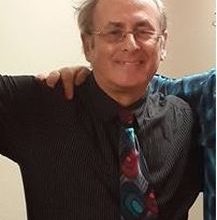Flash Fiction: Coats For Wings by Kent Jacobs
Coats For Wings
I watch the others from the window of my second floor flat, engaged – as they often are – in aimless chitchat. They have scripted intent and are preoccupied with the humdrum activities that stuff an ordinary life. I envy those flat stones, the way they skim across the surface of this vast, bottomless ocean.
I lift a cigarette to my mouth and hold it steady for exactly three beats before drawing. Smoke fills my lungs and gathers there, before I purse my lips and blow it to the ceiling – evenly. My shoulders are relaxed; my feet planted exactly six inches apart. Although I have no curtains, no one notices me there: this colourless chameleon. It chose me though, this life. I could never untangle myself from it, just like the twisted, wet blankets of my childhood nightmares.
The white, matt walls of my hallway feel smooth as my fingertips glide across them, except in two places where the paint had dried thickly. There are fifteen steps to the bottom of the stairs, each taken with an equal distribution of weight, the only eyes my own, yet cruelly judgemental. A bin and my bike are crammed into the six-by-four foot space there, static like a snapshot. I kick the mudguard to see it rattle and so verify my agency.
It was time, time to join them.
What will be the first thing my eyes see when I open the door? This would be my point of entry, the catalyst for a sequence of moments, noted for future reference. A blackbird looks at me, its simple soul torn between the worm and the trespasser closing the door. Clearly, its fledglings are more important than this ghost that wafts silently by, because, although its wings flutter as if to take flight, its claws cling firmly to the fence.
I pause by the roadside, watching an open-top convertible hum by and consider the starlet at the wheel, her auburn hair snaking around her sunglasses in the vacuum of displaced air. Delicately and with poise, she plucks strands from her lips and continues on, oblivious of everything except ‘There Must Be An Angel’ playing on the car radio.
As I step onto the curb on the other side of the road, the spaces I vacate diminish, while the space I step into swells with the noise of possibility. I live there in that void, ethereal, weightless, like a finger through smoke. There is but one constant: the smile on my face. It had been one of the first moments I thumb-nailed as I grew into my skin, and it served me well over the years. However, just like the smoke, it is fragile and my eyes convey the sadness my lips attempt to conceal. The world presses at my back, the unknowable chilling the warmth of the rock I carry deep in my pockets. I cling onto it, trying to ignore the ugly, dim-witted fool I see reflected in the shop windows as I pass, unable to ignore him, unable to forgive him.
A willowy youth strolls towards me, face ashen, eyes unseeing. There is no joy in his gait, just a stumbling forward momentum that speaks volumes of the autopilot sat uncomfortably in his head. His words are hidden behind thin, dried lips, and even though I tempt them with a nod of recognition, they are prisoners of his tongue.
How do people lose themselves in a world full of mirrors?
The supermarket is in full flow, its blood the feet of a hundred patrons, shuffling backwards and forwards through the maze, each lost in this world of marketing. Here, the abstract merges with the real, the promise of quality, as thin as the label they are printed on. A woman considers two tins of beans, reading the small print carefully. Once she has decided upon the healthiest, she drops her choice into a trolley – alongside the multi-pack of assorted crisps, and the jumbo tub of chocolate-chip ice-cream. Her chubby son plucks at her hem, the pudgy finger of his other hand, pointing out the pick-and-mix. Further down the aisle a suited, sour-faced man, lolls on the handle of a trolley and feigns intrigue as his wife weighs size with cost, chirruping like a caged canary.
I’m here for my dole, which is served up as an affirmation of my insignificance.
The doors slip aside and I leave the sickly warmth of the blower in the lobby, emerging into sunlight. A jam of cars is backed up from a set of traffic lights and I scoot through a gap, my eyes focused on my flat a block away. I wait for ‘Walk’ and cross the crossing, seeking the shadow of the houses, with their lace curtains and hanging baskets. There are many eyes but I do not feel seen as I amble along the pavement, sanctuary only one minute and thirty-five seconds away.
There is no blackbird to welcome me back.
I run up the stairs and close the door to my flat with my back, the public smile slipped off like ill-fitting shoes. I take a cigarette paper from the table and pinch Amber Leaf tobacco from a pouch, teasing it along the paper until it is spread perfectly. With the tip of my tongue, I lick along the sticky edge and then roll it between my fingers and thumb, twisting one end, which I poke between my lips. I flick a clipper, light the cigarette, and take a few drags.
The window is calling.
I remember when I was twelve, sitting on the balcony at the Saturday matinee and marvelling as those enormous curtains swept aside. The hush that fell was so sweet, so comforting, as the reel flickered into motion and the certification hopped and crackled, before the main feature began. A tubular craft spiralled to earth, sparkles for thrust. It was just me, the screen, and a bag of Opal Fruits. Flash Gordon towered above me, bigger than anything in the theatre. For two hours, the world did not exist, just a distant planet, a cartoon with Daffy Duck and a documentary about polar bears.
I was always disappointed when the lights went on and the exits let in the outside. I would sit there until the cinema was empty before rising to leave; because through the exit I could see the thing I could never be; through the exit, I could see the thing I could never know:
I saw the children using their coats for wings.
About the author
Kent Jacobs lives in Great Grimsby, a seaport town located on the East coast of Lincolnshire, on the South Bank of the Humber Estuary. His mother, Thelma, braided nets for trawlers and his father, Frank, worked as a foreman in a fish packing factory, while his uncles were shipwrights and trawler-men. Paul had held many things associated with the sea, but holding the pen is all he ever truly loved. He was published in a London magazine called ‘Rattler’s Tales’ which has been his only real claim to fame so far. Hopefully, this publication will be the catalyst to drive him on to fulfil his dreams.









